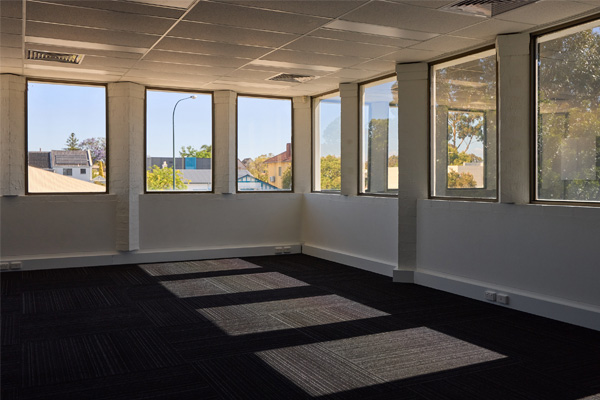Commercial property management and corporate property management sound similar, are they the same thing?
While at a glance it might be tempting to put commercial property management and corporate property management in the same bucket, the reality is quite different, with each having different property perspectives and end-goals.
In this article, we’re going to help you understand the differences. First providing an in-depth definition of both, then drawing a compare and contrast to help make the differences clear.
What is Corporate Property Management?
Corporate property management, also known as corporate rental property management or corporate real estate asset management, focuses on securing and managing properties that support a company’s operations and strategic goals. Occasionally, this can include residential properties, but it is not typically a primary focus. Similar to commercial property management, a corporate property manager deals in commercial properties such as retail, office and industrial properties. This explains the common confusion with “commercial property management” but also points out the first difference, that corporate property management most commonly deals with commercial properties but is not limited to it.
For a corporate property manager, the goal is to acquire, own and lease properties that support a business’s long-term operations and strategic goals. This includes:
- The selection of profit-maximising real estate that aligns with a company’s core operations, values and images beyond the property’s market value.
- Management of properties that assist in the company’s key operations.
- Selecting properties that align with a business’s forecasted expansion, contraction or relocation.
- Aligning a company’s property portfolio to its larger corporate strategy.
Example of corporate property management
A multinational fast-food chain employs corporate real estate asset management to oversee its global real estate portfolio. This would include:
- Site selection: Identifying and securing retail spaces in high-traffic locations that align with the company’s expansion plans.
- Facility management: Ensuring all properties are equipped with the necessary infrastructure required (e.g., a kitchen or stockroom).
- Cost management: Negotiating leases and managing operating expenses.
- Value alignment: Selecting properties which align with the companies’ values such as paying a premium for properties with solar installation, to uphold their sustainability initiatives.
What is Commercial Property Management?
Commercial property management aims to maximise profits and value for investors through their rental income. This includes the management of profitable retail, office and industrial properties that are expected to appreciate well and hold strong rental yields.
Depending on who your commercial property manager is, and your investment needs, your commercial property management may be more or less thorough in their processes.
At Vast Commercial Property, our property management services are extensive, including:
- Lease management
- Finance monitoring & reporting
- Maintenance and repairs
- Tenant relationship management
- Property compliance
- Property value maximisation
Services may vary slightly depending on the investor’s property portfolio size and industry interest, with tailored offers for office, industrial or retail property management, each entailing a slightly different scope of work.
If you are interested, you can read more about each of these services in detail on our Commercial Property Services page.
Example of commercial property management
A commercial property manager in Perth (such as Vast Commercial Property) has been contracted by an individual investor who is looking to grow his portfolio and increase his free time. Here, some of their services would include:
- Site selection: Identifying and securing high-income properties across retail, office or industrial, with an emphasis on the highest revenue properties and growth areas.
- Facility management: Ensuring that properties remain safe for tenants at all times and remain in a high-quality condition for use and renting.
- Cost management: Negotiating leases and managing operating expenses including monthly owner statements, comprehensive end-of-financial-year (EOFY) reports, and meticulous variable outgoings.
- Value alignment: At the investor’s discretion, a commercial property manager may be requested to focus on office, retail, or industrial properties. An investor may also request specific suburbs of interest.

What Are the Differences Between Commercial and Corporate Property Management?
Differences
1. The key objectives
Commercial property management: Interested in maximising the rental income and total profitability of an investor’s portfolio.
Corporate property management: Less focused on rental income, with a focus on securing and managing properties that support a company’s long-term operations and strategic goals.
2. Desirable property traits
Commercial property management:
- Easy access with close proximity to highways and main roads.
- Attractive to potential tenants and (if relevant) customers or employees.
- Contains flexible spaces that can accommodate various business types to suit a wide range of tenants (thereby lowering vacancy rates).
- Potential for value appreciation over time.
- Low operational cost features such as energy-efficient systems.
Corporate property management:
- Strategic locations that align with the company’s operational needs and forecasted growth.
- Zoning that will support a specific business function, in line with the company’s industry and requirements.
- Buildings that will enhance the company’s brand and culture, either through aesthetic appeal or alignment with their values and goals.

3. Company size
Commercial property management: Suited to a diverse range of clients ranging from small, individual investors to larger real estate firms and international investors.
Corporate property management: Utilised by large organisations that typically own or lease properties for their own use.
4. Area of managed properties
Commercial property management: Typically focuses on properties within a specific region to take advantage of managers with in-depth local knowledge and allow for hands-on management.
Corporate property management: Often manages properties across multiple cities, countries or continents with a diverse understanding of real estate markets and international regulations.
5. Scope of management responsibilities
Commercial property management: Hands-on property management tasks including overseeing rent collection, tenant screening and maintenance procedures.
Corporate property management: Concentrates on high-level management primarily concerned with site selection, corporate strategy and operational needs.

6. Property types
Commercial property management: Does not typically discriminate across securing office, retail or industrial spaces, focusing primarily on returns and income, with a focus only on commercial property types.
Corporate property management: Focuses on properties specific to the company’s needs. A corporate property manager may seek out specific property types which benefit the company’s operational needs. This can include residential properties, in the case of employee housing.
Similarities
The obvious similarity between commercial and corporate rental property management is that both services manage commercial properties.
However, as outlined above, they manage these at different levels, with different objectives and responsibilities.
While the names can be confusing, the above differences make it clear that commercial and corporate property management are two distinct services, addressing different sides of the market.
Our Commercial Property Management Services
Think commercial property management is what you’re looking for? Let us give you a hand.
Led by local commercial property owners, with real hands-on experience, at Vast Commercial Property, you receive personalised property management services that go above and beyond. With a laser focus on ROI and exceptional services, we’re proud to say that when you’re working with Vast Commercial Property, you’re working with the experts.


